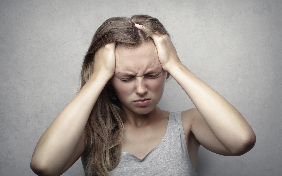September 16, 2021 / Brain & Spine The Cleveland Clinic
Skull-pounding headaches can continue for weeks or even months after you test positive for COVID-19, with around-the-clock pain separated only by periods of agonizing and extreme spikes.
It’s one of the most common symptoms being experienced by a group known as COVID-19 long-haulers, or those with lingering issues related to the coronavirus, says headache specialist Emad Estemalik, MD.
Why is it happening? A definitive answer remains elusive, but there’s no question the problem exists in great numbers, judging by multiple studies.
So let’s look at what we know.
New daily persistent headaches
A headache that develops in connection to a viral illness or infection isn’t particularly groundbreaking, but the situation is being seen more — and with greater pain intensity — in people following a COVID-19 diagnosis.
The condition is known as a new daily persistent headache, and it can last for months even for people who had only a mild case of COVID-19.
“They’re left after the recovery with a new onset headache that doesn’t remit,” says Dr. Estemalik. “A patient will tell you they have a 24/7 baseline of headaches or pain that gets worse from time to time.”
If you regularly deal with migraines or other headache disorders, the frequency may increase following a COVID-19 diagnosis. Again, this pain can persist for weeks or even months.
Treating COVID-19 headaches
Finding relief from a daily persistent headache isn’t easy given that there’s no clear etiology, or cause, behind the pain. Research has yet to pinpoint why the headaches persist. Brain scans of those with persistent headaches tend to be normal.
Complicating matters is that a headache is often just one of many symptoms experienced by COVID-19 long-haulers. Many also report fatigue, shortness of breath, achy joints and chest pain.
Given all of that, “this tends to be a very, very challenging headache to treat or manage,” notes Dr. Estemalik.
Providers typically use an “interdisciplinary approach,” with a variety of treatment options put to use to find what might work best. This can include a combination of medications as well as psychological and physical rehabilitation techniques.
There’s no one proven way to get results, says Dr. Estemalik: “Clinical judgment is very important to make the right determination.”
Home remedies for COVID-19 headaches
Most at-home medicine cabinets include a bottle of over-the-counter painkillers — typically aspirin or ibuprofen — that gets twisted opened in the search for relief when a regular headache strikes.
If you’re dealing with a COVID-19 headache, odds are you’ll go the same route.
A word of caution if you do: Don’t lean on this approach for more than a week. “We sometimes see these medications cause what we call a rebound headache or medication overuse headache,” says Dr. Estemalik.
The condition is exactly what it sounds like: A headache brought on by frequent use of a medicine in a short span of time. Exceeding daily dosage recommendations may trigger a rebound headache. Ditto with caffeine use with the medications.
If an over-the-counter medication doesn’t offer the relief you typically see, take that as a sign. “That’s when you want to reach out to your primary care doctor to really address the issue,” says Dr. Estemalik.
Could that headache be unrelated to the pandemic?
Headaches are part of life. Statistically, 3 out of 4 adults across the world will deal with a pain in their head at some point this year. Another fact? There are more than 150 different kinds of headaches.
So that headache that’s making you rub your temples may not be connected to a recent bout with COVID-19 or a sign that you contracted the coronavirus.
It could be linked to allergies… or stress… or the weather… or even certain food and drinks.
“If you have a headache alone in absence of any other symptoms, it’s probably unrelated to COVID-19,” says Dr. Estemalik. “But always stay on top of your symptoms and — when in doubt — see your doctor.”
The best defense against COVID-19 headache
Dr. Estemalik offers three words of advice for anyone hoping to avoid the headaches and cytokine storm that comes with COVID-19: Get the vaccine.
“Vaccination reduces your chance of getting the infection, and it also has an incredible effect of reducing serious illness and long-haul symptoms even if you were to catch it,” says Dr. Estemalik. “It’s the best thing you can do to avoid the virus and what it brings.”
